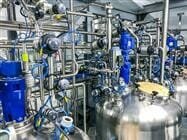Process control systems frequently require updates to account for changes in the manufacturing process, new lines, improvements in efficiency and system upgrades. Whatever the situation, system integrators will very often play an important role in defining system structures and specifying new components; then carrying-out the installation and commissioning work.
This task can often be expedited far more effectively with cooperative support from experienced equipment manufacturers that offer both flexibly stocked and tailored solutions. At least that is the firm belief of Bürkert UK & Ireland, according to the General Manager, Neil Saunders:
From highly specialised pharmaceutical manufacturing to more widespread chemical engineering and food manufacturing processes, modern process control systems cover a huge range of applications and environments. Each component must be designed to exacting standards and offer reliability and efficiency in what can be very demanding circumstances. A pro-active manufacturer that also designs systems can share a wealth of knowledge with its customers that can add value and efficiency to almost any project
Taking up the challenge
System integrators are frequently faced with the challenge of matching the most appropriate products with the customers existing infrastructure and making it all work together within a defined budget. This is no small task and very often the window of opportunity to install and commission the new equipment can be quite limited.
It is therefore fair to assume that system integrators welcome support from original equipment manufacturers (OEMs), especially when it comes with industry expertise as well as a flexible approach to system design. Many manufacturers will claim to offer this, but how far does that promise hold-good?
There will often be a number of possible solutions to a problem, but finding the one that meets the customer’s objectives as well as a timely installation can be slightly more difficult. It is at this point that manufacturers, such as Bürkert, come to the fore; capable of putting together dedicated project teams for larger installations or providing expert advice and components for smaller projects.
From specification advice right through to designing and manufacturing a bespoke product or assembly for an individual application. For example, components and systems operating in potentially explosive atmospheres must be suitably tested and certified as safe for such an environment using the ATEX and IECEx standards. This is an area that requires considerable expertise and design knowledge in order to deliver a packaged solution that is tested and guaranteed to operate safely once installed.
Managing the available assets
Flexibility is the key to providing the most appropriate level of service and a diverse range of high quality products, coupled with extensive design and manufacturing expertise, makes Bürkert a valuable asset when delivering modifications to a process control system. In situations where time is a restricting factor, a considerable amount of pre-assembly can be completed off-site, while precision drawings and meticulous planning make sure that all the new components work seamlessly with the existing infrastructure.
Typically, the integration of new processes and equipment is a one-off task and is unlikely to be repeated across multiple sites, which eliminates those manufacturers that are involved only in large volume projects.
The modular nature of many automation solutions makes them ideal for those looking to expand on a pre-existing installation. Provided the communication protocols are maintained it is relatively easy to install standalone control systems based on a centralised control concept, that contain all of the necessary components to operate valves, including a PLC, input/output systems and valve islands.
Effective communication
Of course, communication of vital data between sensors, valves and the input/output modules is essential and this data also needs to be available to the wider process control centre. This raises the subject of Industry 4.0 and also highlights the issue of communications protocols and how they can be harmonised to ensure seamless data transmission.
By way of an example, Bürkert has developed its efficient device integration platform (EDIP), which is a concept that enables intelligent networking down to the sensor and actuator level. This protocol combines and standardises the hardware, software and communication of Bürkert products. Communication between the EDIP devices takes place using an interface based on the industry standard CANopen with additional features.
Projects that need the expertise of system integrators will usually benefit from the design capabilities and industry expertise of specialist manufacturers. By taking advantage of their knowledge and experience, projects can be optimised both in terms of installation time as well as overall performance.
Burkert manufactures over 100,000 different products, typically valves, actuators, sensors, controllers and combined devices. Applying these products to scenarios that require specialist assemblies requires skill and experience as well as an imaginative approach.







